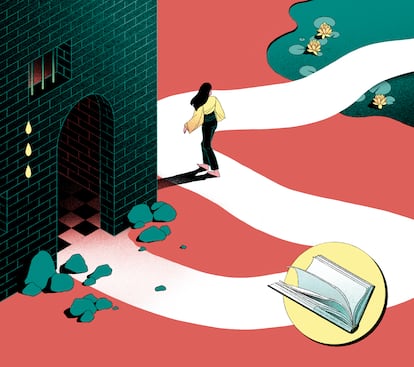Practicing stoicism to confront uncomfortable situations: How to embrace the thought of Seneca, Epictetus and Marcus Aurelius to survive daily life
Good mental health requires facing suffering in a different way. Philosophy provides the tools for strengthening one’s spirit and combatting frustration

“I’m getting by, but I’m not 100 percent.” Following the pandemic, more people are going to mental health professionals for non-specific problems. Life’s difficulties—such as feeling like a failure, dissatisfaction, discouragement and low tolerance for frustration—are becoming chronic issues for many people, but they do not constitute mental disorders.
The current mental health crisis is a symptom of our society, which is increasingly demanding and tends to reinforce narcissistic tendencies. People think in the short term. Social media generates unrealistic expectations. Family and community commitments have largely been forgotten, which raises the risk of loneliness. The goal seems to be not to depend on anyone and not be tied to anything. As Marino Perez says in [Individuo flotante]The Floating Individual, an individual floats alone in the system. In the capitalism of experiences, the subject does not control his/her own time and s/he does not know how to establish priorities, as Jorge Freire explains in his book Agitación [Agitation], in which he analyzes the contemporary human.
It is difficult to find a solution for these problems in a clinical setting. Psychology can propose concrete solutions for specific problems, but nowadays people go to therapy for more general reasons. As a complement, it may be appropriate to use philosophical approaches, the therapeutic effects of which are longer lasting. In this new framework, schools of thought like stoicism are emerging as strong solutions because of their practical usefulness. In fact, cognitive-behavioral therapy is based in part on these ancient philosophies.
Massimo Pigliucci’s book How to be a Stoic contains advice on how to deal with current difficulties. Jorge Freire’s Hazte quien eres, un código de buenas costumbres [Become Who You Are: A Code for Good Habits] is a book in a similar vein. It is time to vindicate reading Epictetus’s Discourses; Seneca’s On the Shortness of Life; and Marcus Aurelius’s Meditations. These works help one find meaning and a more long-term purpose. In Man’s Search for Meaning, Viktor Frankl points out that people who had rich inner lives survived better in concentration camps. These philosophy books pat you on the shoulder and encourage you, but they are also demanding because they aim to strengthen one’s character, a key aspect of our personalities.
Strengthening character means enhancing the virtues that improve coping with one’s own life and considering the needs of others. Resilience—understood as taking charge of what happens to one’s life and gaining momentum to repair oneself, as the neurologist Boris Cyrulnik notes—is an important trait. There are people who are resigned, subscribe to a discourse of victimization or blame others for what happens to them. The Stoics differentiated between what is and is not within one’s own control. It makes no sense to waste time trying to control circumstances, affections, others’ opinions and the past. Fortune is not distributed equally, but change is a constant in life, and everything passes... It is possible to get well again. It is good to have perspective.
As for emotions, the Stoics recommend that one avoid rejoicing histrionically and not get overly carried away by fears, anxieties and anger. Not all emotions lead us down a good path. It is a matter of recognizing these feelings, reflecting on what’s causing them and redirecting them both for our own good and the good of others.
These books reiterate the notion of not seeking happiness in immediate pleasure but rather developing a life dedicated to long-term purposes, which has been shown to be of greater importance for building well-being. This requires introspection, establishing a plan to follow and personal effort. It helps to ask questions such as: if today were the last day of my life, would I be doing this? Why do I care? Does this improve my life? Journaling at the end of the day to answer three questions—what have I done wrong? What have I done right? What could I have done better?—can also be helpful.
Stoicism reinforces the idea of wanting less and enjoying the present moment more. The flood of people seeking help from mental health professionals for minor problems forces us to be aware of the harm that certain social parameters cause individuals. Good mental health does not mean the absence of suffering in the face of such challenges but rather being able to deal with suffering in a different way. The current moment also demands greater individual strength and character to swim against the tide; the practical philosophy of the books mentioned above can serve as both a salve and a reference. While it is not easy, it is worth trying.
Patricia Fernández Martín is a clinical psychologist at the Ramón y Cajal Hospital in Madrid, Spain.
Sign up for our weekly newsletter to get more English-language news coverage from EL PAÍS USA Edition
Tu suscripción se está usando en otro dispositivo
¿Quieres añadir otro usuario a tu suscripción?
Si continúas leyendo en este dispositivo, no se podrá leer en el otro.
FlechaTu suscripción se está usando en otro dispositivo y solo puedes acceder a EL PAÍS desde un dispositivo a la vez.
Si quieres compartir tu cuenta, cambia tu suscripción a la modalidad Premium, así podrás añadir otro usuario. Cada uno accederá con su propia cuenta de email, lo que os permitirá personalizar vuestra experiencia en EL PAÍS.
¿Tienes una suscripción de empresa? Accede aquí para contratar más cuentas.
En el caso de no saber quién está usando tu cuenta, te recomendamos cambiar tu contraseña aquí.
Si decides continuar compartiendo tu cuenta, este mensaje se mostrará en tu dispositivo y en el de la otra persona que está usando tu cuenta de forma indefinida, afectando a tu experiencia de lectura. Puedes consultar aquí los términos y condiciones de la suscripción digital.








































